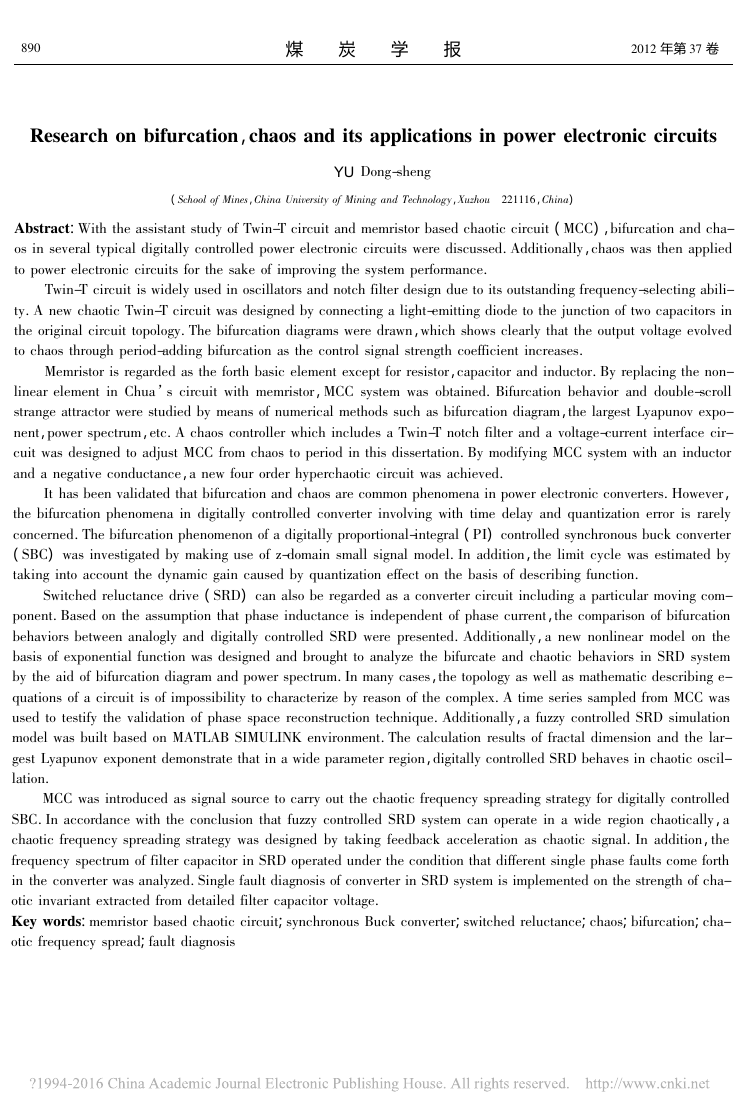DOI:10.13225/j.cnki.jccs.2012.05.013
第 37 卷第 5 期
2012 年 5 月
优秀博士学位论文摘要
煤
炭
学
报
JOURNAL OF CHINA COAL SOCIETY
Vol. 37 No. 5
May
2012
电力电子电路中的分岔、混沌及其应用研究
于 东 升
( 中国矿业大学 矿业工程学院,江苏 徐州 221116
)
摘 要:以 Twin-T 电路和基于忆阻器的混沌电路( Memristor based Chaotic Circuit-MCC) 为辅助,主要
分析了数字控制电力电子电路中的分岔和混沌现象,并将混沌应用到电力电子电路中,以达到性能优
化的目的。
通过在 Twin-T 电路中两个电容直接相连的连接点上接入发光二极管元件,设计了一个新 Twin-
T 混沌电路。以控制信号强度为分岔参数绘制分岔图,结果显示系统随控制信号强度增加经周期递
加分岔步入混沌振荡。利用忆阻器元件取代蔡氏电路非线性二极管,结合分岔图、功率谱、最大 Lya-
punov 指数等数值分析工具研究了系统分岔路径和双涡卷奇异吸引子结构。考虑到 Twin-T 电路优
良的选频特性,设计了一种基于 Twin-T 电路的陷波混沌控制器。此控制器包含了一个陷波滤波器
和一个电压电流转换接口电路。理论分析和实验结果均表明此控制器可以快速有效地将系统混沌控
制到周期轨道上。超混沌系统具有至少两个大于零的 Lyapunov 指数,系统动态规律也更为复杂。通
过修改 MCC,设计了一个新的四阶超混沌电路。采用奇异值分解方法计算系统的 Lyapunv 指数谱,结
果显示系统在某些参数区间内具有两个 Lyapunov 指数的值大于零。
目前对变换器电路中的分岔和混沌现象研究多集中在模拟控制方式下,对于数字控制方式产生
的时间延迟和量化误差很少考虑。以一台数字控制同步 Buck 变换器( Synchronous Buck Converter-
SBC) 为研究对象,利用 z 域小信号模型分析了比例-积分补偿策略下系统的分岔行为。在此基础上,
利用描述函数等效出量化误差在控制环路引入的动态增益,并估算出系统的极限环区间。
开关磁阻调速系统( Switched Reluctance Drive-SRD) 可以看作是包含运动部件的电力电子电路。
由于其特殊的定转子双凸极结构,系统存在铁磁饱和、频繁换相等非线性特征。在假设相电感与相电
流无关的基础上,对比了模拟和数字两种控制方式下 SRD 的分岔行为。考虑到线性模型精度不高的
因素,设计了一个新的基于指数函数的磁链非线性模型,利用分岔图和功率谱分析工具研究了数字控
制 SRD 非线性模型中的分岔和混沌行为。
以 MCC 为测试对象,验证了相空间重构技术恢复系统原吸引子的有效性。采用互信息量和虚假
邻点方法获取最佳重构时延和嵌入维数,同时结合 G-P 算法和小数据量方法计算了系统的分形维和
最大 Lyapunov 指数。在此基础上,基于 MATLAB 的 Simulink 仿真环境构建了采用模糊控制策略的
SRD 系统,并计算其重构相空间的分形维和最大 Lyapunov 指数。计算结果表明模糊控制 SRD 系统
存在较大范围的混沌区间。
混沌信号的一些特殊性质可以采取措施加以利用。以 MCC 电压信号作信号源,实现了 SBC 的
混沌扩频。基于模糊控制 SRD 存在较大范围混沌区间这一研究结论,提出一种基于反馈转差变换率
序列的 SRD 系统混沌扩频策略,仿真和实验结果均证实此扩频策略可以有效降低系统在开关频率及
次谐波点的功率谱尖峰幅值。同时,分析数字控制 SRD 变换器不同单相故障下滤波电容电压频率
谱,结合细节电压信号的混沌特征不变量,实现了变换器单相故障的识别。
关键词:忆阻器混沌电路; 同步 Buck 变换器; 开关磁阻; 混沌; 分岔; 混沌扩频; 故障诊断
作者简介:于东升(
1982—
) ,男,江苏邳州人,讲师,博士。E-mail
:
dongsiee@ 163. com
�
098
煤
炭
学
报
2012 年第 37 卷
Research on bifurcation
,
chaos and its applications in power electronic circuits
(
School of Mines
,
China University of Mining and Technology
,
Xuzhou 221116
,
China
)
YU
Dong-sheng
:
With the assistant study of Twin-T circuit and memristor based chaotic circuit
Abstract
os in several typical digitally controlled power electronic circuits were discussed. Additionally
to power electronic circuits for the sake of improving the system performance.
(
) ,
MCC
bifurcation and cha-
,
chaos was then applied
Twin-T circuit is widely used in oscillators and notch filter design due to its outstanding frequency-selecting abili-
ty. A new chaotic Twin-T circuit was designed by connecting a light-emitting diode to the junction of two capacitors in
,
the original circuit topology. The bifurcation diagrams were drawn
which shows clearly that the output voltage evolved
to chaos through period-adding bifurcation as the control signal strength coefficient increases.
Memristor is regarded as the forth basic element except for resistor
,
capacitor and inductor. By replacing the non-
MCC system was obtained. Bifurcation behavior and double-scroll
linear element in Chua’s circuit with memristor
,
the largest Lyapunov expo-
strange attractor were studied by means of numerical methods such as bifurcation diagram
,
etc. A chaos controller which includes a Twin-T notch filter and a voltage-current interface cir-
nent
cuit was designed to adjust MCC from chaos to period in this dissertation. By modifying MCC system with an inductor
and a negative conductance
,
a new four order hyperchaotic circuit was achieved.
,
power spectrum
,
It has been validated that bifurcation and chaos are common phenomena in power electronic converters. However
the bifurcation phenomena in digitally controlled converter involving with time delay and quantization error is rarely
controlled synchronous buck converter
concerned. The bifurcation phenomenon of a digitally proportional-integral
,
(
the limit cycle was estimated by
was investigated by making use of z-domain small signal model. In addition
SBC
PI
(
)
)
,
(
)
taking into account the dynamic gain caused by quantization effect on the basis of describing function.
SRD
Switched reluctance drive
can also be regarded as a converter circuit including a particular moving com-
,
the comparison of bifurcation
ponent. Based on the assumption that phase inductance is independent of phase current
,
behaviors between analogly and digitally controlled SRD were presented. Additionally
a new nonlinear model on the
basis of exponential function was designed and brought to analyze the bifurcate and chaotic behaviors in SRD system
,
by the aid of bifurcation diagram and power spectrum. In many cases
the topology as well as mathematic describing e-
quations of a circuit is of impossibility to characterize by reason of the complex. A time series sampled from MCC was
,
used to testify the validation of phase space reconstruction technique. Additionally
a fuzzy controlled SRD simulation
model was built based on MATLAB SIMULINK environment. The calculation results of fractal dimension and the lar-
,
gest Lyapunov exponent demonstrate that in a wide parameter region
digitally controlled SRD behaves in chaotic oscil-
lation.
MCC was introduced as signal source to carry out the chaotic frequency spreading strategy for digitally controlled
,
a
SBC. In accordance with the conclusion that fuzzy controlled SRD system can operate in a wide region chaotically
,
chaotic frequency spreading strategy was designed by taking feedback acceleration as chaotic signal. In addition
the
frequency spectrum of filter capacitor in SRD operated under the condition that different single phase faults come forth
in the converter was analyzed. Single fault diagnosis of converter in SRD system is implemented on the strength of cha-
otic invariant extracted from detailed filter capacitor voltage.
Key words
otic frequency spread
memristor based chaotic circuit
synchronous Buck converter
switched reluctance
fault diagnosis
bifurcation
chaos
cha-
:
;
;
;
;
;
;
�




 2023年江西萍乡中考道德与法治真题及答案.doc
2023年江西萍乡中考道德与法治真题及答案.doc 2012年重庆南川中考生物真题及答案.doc
2012年重庆南川中考生物真题及答案.doc 2013年江西师范大学地理学综合及文艺理论基础考研真题.doc
2013年江西师范大学地理学综合及文艺理论基础考研真题.doc 2020年四川甘孜小升初语文真题及答案I卷.doc
2020年四川甘孜小升初语文真题及答案I卷.doc 2020年注册岩土工程师专业基础考试真题及答案.doc
2020年注册岩土工程师专业基础考试真题及答案.doc 2023-2024学年福建省厦门市九年级上学期数学月考试题及答案.doc
2023-2024学年福建省厦门市九年级上学期数学月考试题及答案.doc 2021-2022学年辽宁省沈阳市大东区九年级上学期语文期末试题及答案.doc
2021-2022学年辽宁省沈阳市大东区九年级上学期语文期末试题及答案.doc 2022-2023学年北京东城区初三第一学期物理期末试卷及答案.doc
2022-2023学年北京东城区初三第一学期物理期末试卷及答案.doc 2018上半年江西教师资格初中地理学科知识与教学能力真题及答案.doc
2018上半年江西教师资格初中地理学科知识与教学能力真题及答案.doc 2012年河北国家公务员申论考试真题及答案-省级.doc
2012年河北国家公务员申论考试真题及答案-省级.doc 2020-2021学年江苏省扬州市江都区邵樊片九年级上学期数学第一次质量检测试题及答案.doc
2020-2021学年江苏省扬州市江都区邵樊片九年级上学期数学第一次质量检测试题及答案.doc 2022下半年黑龙江教师资格证中学综合素质真题及答案.doc
2022下半年黑龙江教师资格证中学综合素质真题及答案.doc